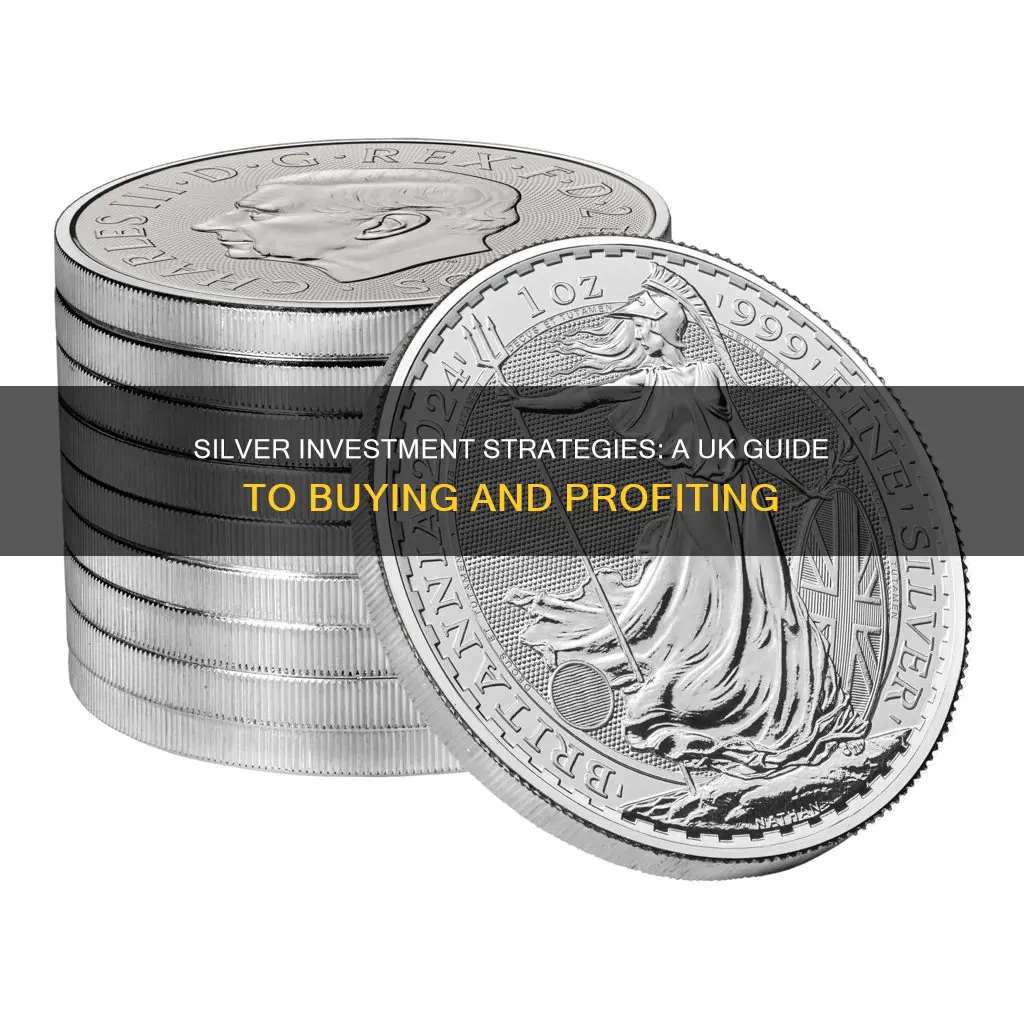
Silver is a popular investment choice, and there are several ways to buy it in the UK. You can buy physical silver, such as bullion bars and coins, through online dealers or pawn shops. Silver bars are usually available at lower premiums than coins and are more cost-efficient. Certain silver coins, such as Silver Britannias, are exempt from capital gains tax, making them a tax-efficient investment.
You can also invest in silver indirectly through exchange-traded funds (ETFs) or by buying shares in companies involved in silver mining and production. ETFs that invest in silver include iShares Silver Trust (SLV) and Aberdeen Standard Physical Silver Shares ETF (SIVR).
Before investing in silver, it's important to understand the risks involved, such as price volatility, storage and insurance costs, and the lack of yield.
| Characteristics | Values |
|---|---|
| Why invest in silver? | Silver is a good investment due to its ability to diversify a portfolio, its role as a hedge against inflation, its broad industrial utility, and its affordability compared to other precious metals. |
| Forms of silver investment | Physical silver (bars, coins), silver-based investment products (ETFs, ETCs), silver funds, shares in silver mining companies, silver futures, silver options |
| Advantages of physical silver | Tangible asset, portfolio diversification, hedge against inflation, high liquidity, universal appeal, privacy in transactions |
| Disadvantages of physical silver | Price volatility, storage and insurance costs, lack of yield, market liquidity issues |
| Advantages of silver ETFs | Broader exposure to silver price movements, convenience, lower costs, no storage issues |
| Disadvantages of silver ETFs | Counterparty risk, tracking errors, management fees |
| Silver investment process | Identify a reputable dealer, register on their website, explore products, make a selection, checkout, execute payment |

Buying physical silver
Physical silver is a popular way to invest in the metal, and there are a few options for how to do this. You can buy silver bars, coins, or bullion, and there are benefits to each.
Silver Bars
Silver bars allow you to own a large amount of the metal in a compact unit, which can be stored safely and discreetly at home or in a secure storage unit. Bars also tend to be available at lower premiums than coins due to lower manufacturing costs, making them a more cost-efficient investment.
Silver Coins
Silver coins are often defined as legal tender and are issued by governments, mints, and central banks across the globe. They are a good option if you want something internationally recognised and backed by a specific government or central bank. In addition, rare or particularly interesting coins may attract increased demand from collectors, which can result in them being sold for far higher prices than their bullion value. Certain silver coins, such as Silver Britannias, are also considered legal tender and are therefore exempt from capital gains tax in the UK.
Silver Bullion
Bullion refers to any bulk precious metal in the form of bars, ingots, or specialized coins. It is a good option if you want to take physical possession of silver without the higher premiums often associated with coins.
Where to Buy Physical Silver
You can buy physical silver from local dealers, pawn shops, or online dealers. When buying physical silver, it is important to identify a reputable dealer with a longstanding industry presence and reliability.
Things to Consider
Physical silver requires storage, so you will need to factor in the cost of a safe or renting a deposit box, along with insurance coverage. It can also be easy to overpay for physical silver, so be sure to note the spot price to ensure you are getting a fair deal.
Other Ways to Invest in Silver
There are several other ways to invest in silver that do not involve physical possession of the metal. You can buy shares in companies involved in the mining and production of silver, or you can invest in silver funds, such as exchange-traded funds (ETFs) that own physical silver or silver futures contracts.
Savings Indirectly Matched with Investors
You may want to see also

Silver ETFs
Exchange-traded funds (ETFs) are an easy and flexible way to invest in silver. Silver ETFs are funds that are physically backed by silver and trade on exchanges like stocks. They are designed to track the price of silver, so their value reflects the current price of the metal. With ETFs, you can invest in silver without having to take physical delivery of the metal. This option offers several benefits, including the ability to trade during market hours and low expense ratios.
To buy silver through ETFs, you simply purchase shares of the ETF, which can be done through a brokerage account. Each share represents a fixed amount of silver, so you own a proportional amount of the metal. The benefit of this method is that you avoid the hassle and cost of storing physical silver, and you can easily sell your position by trading your shares.
Some popular silver ETFs available to UK investors include iShares Physical Silver ETC (ISPH), WisdomTree Physical Silver (WISA), and ETFS Physical Silver (PHAG). These ETFs are backed by physical silver bullion held in secure vaults, providing investors with direct exposure to the silver price. When researching silver ETFs, it is important to consider factors such as the fund's expense ratio, the liquidity of the ETF, and the storage arrangements of the physical silver.
Another option is to invest in silver mining ETFs, which offer exposure to the performance of companies involved in the production of silver. These ETFs provide a diversified way to invest in the silver industry and can be a good option for those who want to avoid the direct price volatility of the metal. Examples of silver mining ETFs available in the UK include iShares MSCI Global Silver and Metals Miners Producers UCITS ETF (GLTP) and WisdomTree Silver UCITS ETF - Acc (SILV).
Remember, as with any investment, there are risks associated with silver ETFs. The value of your investment will fluctuate with the price of silver, and there may be additional risks associated with the specific ETF structure or the performance of the silver mining companies if you choose that route. It is always important to conduct thorough research and understand the risks before investing.
Training Investments: Why Bother?
You may want to see also

Silver mining stocks
- Fresnillo: The world's largest silver producer from ore, as well as Mexico's second-largest gold miner. The company operates seven mines and owns one of the largest precious metals land reserves in Mexico.
- Pan American Silver: One of Canada's most diversified mining companies, with mines in Canada, Mexico, Peru, Bolivia, Argentina, and Guatemala.
- Hecla Mining: The largest silver producer in the United States and one of the oldest precious metals mining companies listed on the New York Stock Exchange.
- First Majestic Silver: A pure silver play, with three silver mines in Mexico.
- Hochschild Mining: A British-based operator of four underground mines in Peru and Argentina.
- Fortuna Silver Mines: A Canadian-based silver miner with mines in Peru and Mexico.
- Polymetal International: An Anglo-Russian precious metals mining company listed on the London Stock Exchange.
- Endeavour Silver Corporation: A mid-tier precious metals miner that operates three high-grade silver and gold mines in Mexico, as well as other mines in Chile.
- Wheaton Precious Metals: A Canadian-based precious metal streaming company that doesn't own or operate mines but has contracts with owners to purchase by-product precious metals.
- Newmont Mining: The largest gold mining company in the world, producing silver, copper, zinc, and lead.
When investing in silver mining stocks, it is important to remember that they can be incredibly volatile as the share price movement is often linked to the underlying price of silver. Conduct thorough research and analysis before investing in any stock.
The RRSP Dilemma: Investing for the Future or Paying Off Debt?
You may want to see also

Silver futures
However, silver futures are not without their risks. Leverage can amplify profits, but it can also lead to losses exceeding your initial investment if the market turns against your position. This is a key risk to be aware of and one that makes silver futures a more complex and challenging prospect for the average investor.
Margin calls are another risk. If the market moves against your position, you may be required to deposit additional funds to maintain your position. Failure to do so could result in the liquidation of your position, leading to a loss.
Empowering Your Retirement: Navigating Investment Changes
You may want to see also

Silver bullion
Silver bars are manufactured by world-renowned, LBMA-approved refiners such as PAMP, Scottsdale, and Umicore. They are weighted and marked in both grams and troy ounces, with the smallest bar being 1 gram and the largest over 1000 troy ounces. Silver bars are minted ingots or cast/hand-poured bars, with the former being more highly refined and featuring more elegant visuals and refined design elements.
When buying silver bullion, it's important to identify a reputable dealer with a longstanding industry presence and reliability. It is also worth noting that certain silver coins, such as Silver Britannias, are considered legal tender in Great Britain and are therefore exempt from capital gains tax (CGT), making them a great way to invest in silver in the UK.
United Airlines: Invest Now?
You may want to see also
Frequently asked questions
Silver is a good investment option due to its ability to diversify a portfolio. It often marches to its own beat, stabilising your portfolio by retaining or even appreciating in value when other assets falter. Silver is also a renowned hedge against inflation and is more affordable than other precious metals like gold. Lastly, silver has broad industrial utility, ensuring consistent demand and bolstering its resilience as an investment.
Silver prices can be volatile and are influenced by factors such as supply and demand, market sentiment, and economic data. This can lead to potential losses if prices swing unfavourably. Silver should be considered a long-term investment. There are also costs associated with storing and insuring physical silver, and it does not provide dividends or interest.
There are several ways to invest in silver, including buying physical silver (bars or coins), investing in silver mining companies, exchange-traded funds (ETFs), or silver futures and options.
To buy physical silver, identify a reputable dealer, register on their website, explore their products, and make your purchase. Ensure you understand the tax implications and consider storage options and insurance for your silver.







